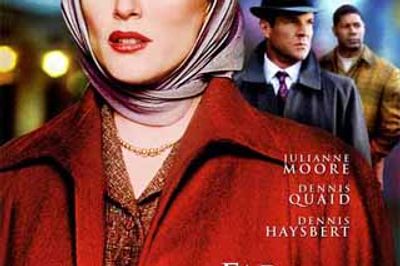by Ben Grimwood
Movie critic
*** ½ out of ****
I love retro styles in modern film, and Todd Haynes’ artistically sumptuous “Far from Heaven” (2002) is a good representative. The film, whose name comes, in part, from Douglas Sirk’s 1955 “All That Heaven Allows,” is both a carefully calculated, Sirkian homage to the decade and a fascinating criticism of its conventions.
The lush cinematography, saturated colors, and lavish setting, costuming, and lighting that characterize German-born director Sirk’s Hollywood work are intended to represent artificiality, and Haynes uses it to his advantage in his story of the perfect nuclear family, Frank and Cathy Whitaker (Dennis Quaid and Julianne Moore), whose fairy tale life comes crashing down around them.
Even though Todd Haynes, a notable director of New Queer Cinema, uses homosexuality again in this film as a plot twist, his film goes beyond that theme and presents themes outside the box. In addition to encompassing racial and female oppression and repression, “Far from Heaven” is a criticism of society’s homogeneity and demonstrates what it means to be different.
Three Reasons to See “Far from Heaven”:
1.) Todd Haynes is a prominent director of New Queer Cinema.
2.) Julianne Moore received an Oscar nomination for Best Actress (2002).
3.) The sight of Dennis Quaid making out with another guy.
“Far from Heaven” is full of outstanding performances, the finest being that of Julianne Moore as Cathy Whitaker. Moore makes robotic and conservative Cathy into the pristine, uber-nuclear mom at the beginning of the film. However, as her character grows out of convention and inadvertently becomes a supporter of racial integration in her town, Moore emerges as a touching, emotional, and sympathetic woman unable to exact her deepest feelings for her gardener, Raymond Deagan, simply because he is black.
The binary anguish and emptiness that crosses her sensitive face are often heartbreaking. In addition, the two sources of her anguish, Dennis Haysbert as Deagan and Dennis Quaid as Frank Whitaker, both turn in great performances in their own right. Haysbert’s Deagan is a warm, tender soul and a performance not unlike that of Morgan Freeman’s Hoke from 1989’s “Driving Miss Daisy.”Quaid’s miserable, homosexually repressed Frank strongly recalls the wounded masculinity of drunken Robert Stack in Sirk’s “Written on the Wind.”
It is this abundance of repression that drives the essence of Haynes’ film as it daringly tears down the notion of the ‘50s as G-rated bliss. All of the main characters are fighting their natural desires to meet societal conventions, and this practice disgusts Haynes. Under the surface, Haynes’ film calls for a new humanism, one for accepting difference. We are all people, Haynes’ film says: black, white, man, woman, heterosexual or homosexual.
